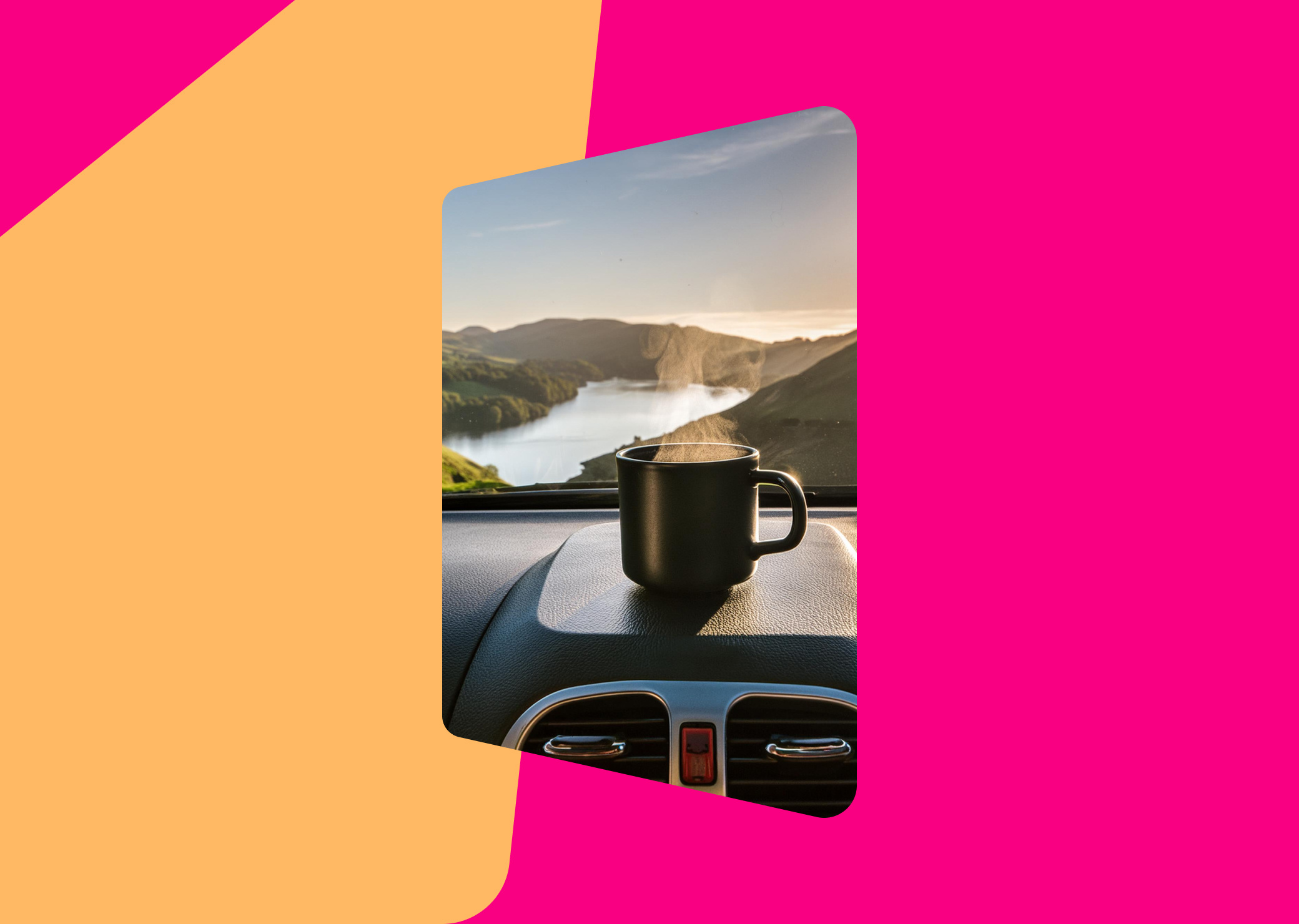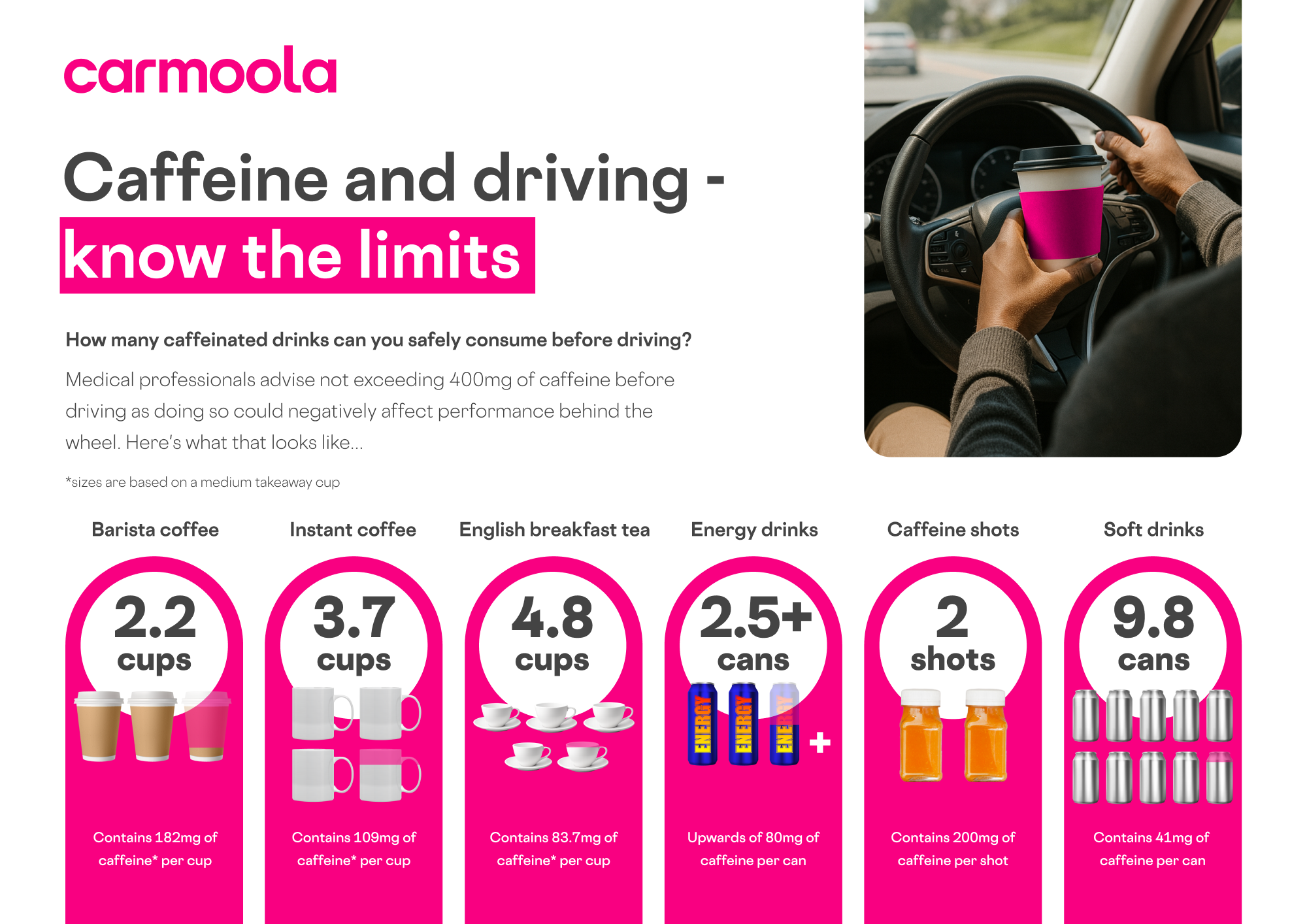- 🗞 Lifestyle
- Last updated: Oct 27, 2025
- 12 Min Read
Do You Know Your Caffeine Driving Limits?
Written by

Verified by


See how much you can borrow in 60 seconds
| Representative Example | |
|---|---|
| Loan amount | £10,000 |
| Interest rate | 13.9% APR |
| 54 payments of | £246 |
| Total cost of credit | £3,284 |
| Option to purchase fee | £1 |
| Total payable | £13,285 |
New research from Carmoola, in partnership with NHS GP Dr Tim Mercer and Road Safety GB, reveals that 11 million UK drivers exceed the safe daily caffeine limit.
One in four drivers (25%) admit caffeine has left them feeling jittery, anxious or distracted behind the wheel - a figure that rises to 48% among 17–24-year-olds.
Experts warn that consuming more than 400 mg of caffeine a day - roughly the equivalent of one large cappuccino or two and a half energy drinks - can impair concentration and judgement while driving.
Britain’s hidden caffeine habit
Carmoola’s 'Curbing The Caffeine' campaign shines a light on the UK’s growing caffeine culture - at a time when energy drink sales are surging nationwide.
The findings come as the UK Government prepares to tighten restrictions on the sale of highly caffeinated drinks.
How much is too much?
In collaboration with Dr Tim Mercer, GP Partner at TJ & SE Mercer Healthcare Ltd, Carmoola’s research shows that while moderate caffeine intake (up to 300 mg) can boost alertness, higher doses can have the opposite effect.
“While the NHS advises that 400 mg of caffeine per day is a safe upper limit for most healthy adults, exceeding these levels can lead to restlessness, palpitations and anxiety,” says Dr Mercer.
“For motorists, it’s vital to stay calm and in control - too much caffeine can cause jitteriness and even urinary urgency, both of which can be distracting behind the wheel, where your full attention should be on the road.”
|
Caffeine consumption by drink and how many Brits are exceeding the safe limits |
|||
|
Popular caffeinated drink |
Average mg of caffeine per drink |
Number of drinks that could lead to caffeine toxicity |
Brits consuming at least this amount daily |
|
Barista coffee |
182mg per medium takeaway cup* |
2.2 medium cups |
10% |
|
Instant coffee |
109mg per medium takeaway cup* |
3.7 medium cups |
9% |
|
English breakfast tea |
83.7mg per medium takeaway cup* |
4.8 medium cups |
9% |
|
Energy drinks |
Upwards of 80mg per can* |
5 cans, or as few as 2.5 depending on brand |
8% |
|
Caffeine shots |
200mg per shot |
2 shots |
7% |
|
Soft drinks |
41mg per 330ml can |
9.8 cans |
4.3% |
Young drivers most affected
Nearly half of 17–24-year-olds (48%) have experienced caffeine-related side effects while driving, with 16% saying it happens often.
Men were twice as likely as women to report these symptoms (11% vs 5%).
One in twenty (5%) drivers - rising to 9% among 25–34-year-olds - believe they “could not drive properly” without caffeine. This figure triples in London, where 14% of drivers say they rely on it to drive.
Expert insight: when caffeine backfires
“Caffeine can temporarily mask tiredness, but it doesn’t reverse sleep deprivation,” explains Dr Mercer.
“If you’re sleep-deprived, the real solution is rest - even a short power nap can make a greater difference than another cup of coffee.”
Awareness of caffeine’s potential impact on driving remains low, with one in three drivers (31%) unaware that excessive intake can affect performance. Among drivers over 45, that rises to 39%.
Over two-thirds of the group surveyed (67%) agreed that official guidelines on safe caffeine consumption before driving should exist - similar to drink-driving limits.
Balancing alertness and safety
“Caffeine can make you feel more alert, but over-reliance can lead to dependency and withdrawal,” adds Dr Mercer.
“Moderation is key - stay hydrated, eat regularly, and consider decaf options. Even the ritual of a decaf coffee can give a mental lift without the side effects.”
Carmoola's perspective
“Caffeinated drinks are enjoyed by millions every day and can be a useful boost,” says Aidan Rushby, Founder and CEO of Carmoola.
“But our research shows that moderation and timing are key. Too much caffeine before getting behind the wheel can actually reduce alertness and concentration.”
Road Safety GB's message
“Many drivers rely on caffeine to fight off tiredness, but it’s only a temporary fix,” says James Gibson, Executive Director of Road Safety GB.
“Overdoing it on coffee or energy drinks can make you restless, anxious, or unfocused. If fatigue sets in, the safest choice is to stop and rest properly.”
Caffeine awareness guide
As part of the campaign, Carmoola has launched an easy-to-read visual guide, inspired by alcohol unit charts, showing the caffeine content of popular drinks - from tea and coffee to energy shots - alongside safe thresholds for drivers.

Methodology
The survey research was conducted by Censuswide, among a nationally representative sample of 2,000 UK respondents (aged 16+). The data was collected between 01.08.2025 - 05.08.2025 and explored caffeine consumption habits, daily driving behaviours, and public attitudes towards caffeine and road safety. Censuswide abides by and employs members of the Market Research Society, follows the MRS Code of Conduct and ESOMAR principles, and is a member of the British Polling Council.
As part of the campaign, Carmoola partnered with Dr Tim Mercer who provided expert medical insights into caffeine consumption from a series of studies, health recommendations, and the impacts of excessive intake on concentration and alertness. Road Safety GB also contributed expertise on how caffeine use may impact drivers, alongside practical advice on curbing intake and staying alert safely while on the road.
To compile the index of caffeine levels in popular drinks, Carmoola used data from a range of authoritative sources including BBC Good Food, Monster Energy, Red Bull, and Nutrition X. The average caffeine content (mg) per beverage was calculated by dividing the reported caffeine content by the serving size (ml), in order to create a consistent comparison across drinks.
To discover the caffeine per medium-sized drink, Carmoola used Costa Coffee’s sizing chart as the baseline for “medium” measurements. Costa Coffee was selected as the source given its position as the UK’s most popular coffee shop in 2025, and therefore the most common takeaway size reference point for British consumers. The chart also refers to a large cappuccino containing four shots of coffee, equivalent to 400 mg of caffeine.
For energy drinks, Carmoola based its calculations on the most commonly consumed brands in the UK. Red Bull (80 mg of caffeine on average) and Monster Energy (160 mg on average) were reported as the most popular among consumers, with 21% and 22% of respondents consuming them daily, respectively. Relentless and Rockstar were less frequently consumed (12%) but, like Monster, contain high levels of caffeine - approximately 160 mg per can.
For this reason, energy drinks have been presented as containing “upwards of 80 mg” of caffeine per serving, to reflect both the most popular options and the higher-strength alternatives consumed by a smaller proportion of drivers.
Caffeine shots and soft drinks were calculated independently using standard can or shot sizes as per manufacturer information, based on the average caffeine content across all popular brands.
The 11 million figure is an estimate based on the 41.9 million licensed vehicles in the UK, according to the DVLA, and has been based on Carmoola’s survey findings.
GOV.UK: ‘Banning the sale of high-caffeine energy drinks to children’
Front Psychiatry: ‘The Safety of Ingested Caffeine: A Comprehensive Review’
See how much you can borrow in 60 seconds
| Representative Example | |
|---|---|
| Loan amount | £10,000 |
| Interest rate | 13.9% APR |
| 54 payments of | £246 |
| Total cost of credit | £3,284 |
| Option to purchase fee | £1 |
| Total payable | £13,285 |
Related articles
Gone in 30 days... or not: The UK’s speediest and sleepiest car sales
In the fast-paced world of car sales, some models barely touch the showroom floor before finding a new owner, while others seem...
Do You Know Your Caffeine Driving Limits?
New research from Carmoola, in partnership with NHS GP Dr Tim Mercer and Road Safety GB, reveals that 11 million UK drivers...
Driving change together: why Carmoola’s dealership approach puts customers first
If you’ve been following Carmoola’s journey, you’ll know we’re on a mission to bring simplicity, speed and transparency to car...

.webp?width=832&height=592&name=customer-support%20(1).webp)










.webp?width=400&height=285&name=online-shoppers-with-dog%20(1).webp)


.jpg?width=500&height=356&name=Vintage%20car%20going%20to%20an%20old%20town-1%20(1).jpg)





